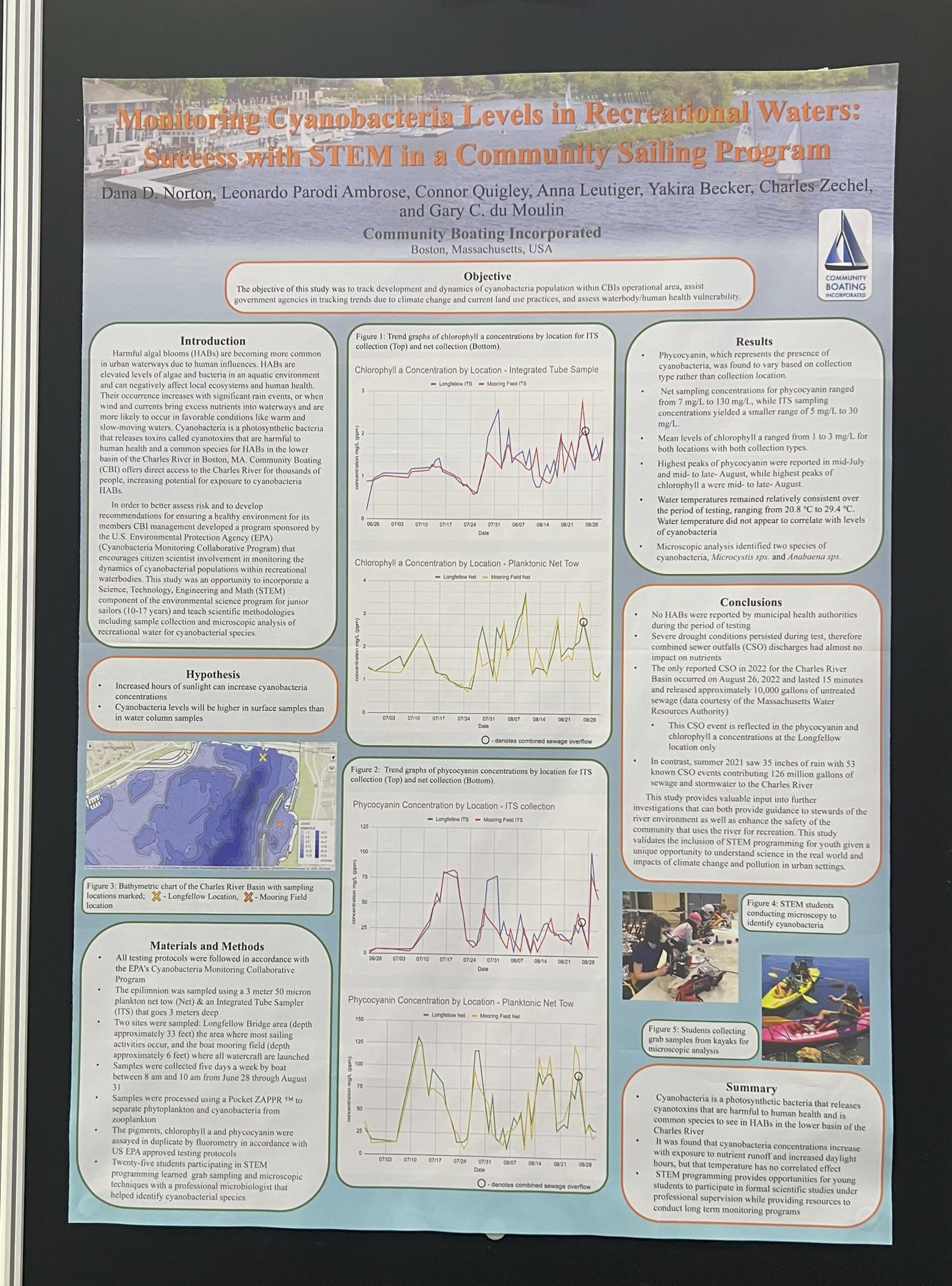Summer Research at CBI’s Cyanobacteria Lab
Have you seen the headlines about blue-green algae in the Charles River? Well, it’s not blue. And it’s not algae. It’s cyanobacteria.
Cyanobacteria exist at some level in almost every body of fresh water. In recent years, the media has reported about cyanobacteria blooms in the Charles River Lower Basin. Under some circumstances, a bloom might produce cyanotoxins, which are harmful to ingest. This is particularly concerning for dog walkers who might let their pets drink from the river. There’s a lot of science to be done to fully understand the environmental and health risks associated with cyanobacteria. Community Boating is doing its part.
In 2022, Community Boating (CBI) launched a cyanobacteria monitoring program as part of our long-standing junior program STEM initiative. That summer, our lab director Dana Norton, with support from microbiologist Dr. Gary C. du Moulin and CBI staff member Leonardo Ambrose, led a team of mostly high school students in a survey of cyanobacteria levels in the Charles River lower basin. The research team collected samples from a skiff, measured them with microscopy and fluorometry, and analyzed the resulting data to draw conclusions about the Charles River Basin’s water quality. The data will help CBI guide its members and the public regarding potential health risks associated with cyanobacteria in the Charles.
In addition to helping CBI, the lab is gaining recognition in the scientific community. Norton and team submitted their research to the Society of Environmental Toxicology and Chemistry (SETAC). Norton and two of the primary researchers, 16-year-old Connor Quigley and 14-year-old Anna Lena Leutiger, presented their research at the SETAC conference in Dublin in May.
High school students learn STEM skills at CBI
Norton is a toxicology graduate student at The Citadel in Charleston, South Carolina. Her interest in toxicology started young. “A lot of my cyano-work is based on a water quality monitoring program I helped run as a high school intern,” she said. “It’s part of the reason I was so excited about including CBI’s junior program sailors in our cyanobacteria monitoring program at CBI.”
Cyanobacteria intern Connor Quigley is a student at Brookline High School, where he studies honors biology. He said “I greatly enjoyed being a cyanobacteria intern, especially learning field and lab techniques. Our data and analysis directly impact efforts to understand the health of the Charles River, and help keep community members and visitors informed, healthy, and safe.”
Quigley and intern Anna Lena Leutiger have both been sailing at CBI since 2019. Leutiger said, “CBI is a great local community with activities where you meet new people against the wonderful backdrop of the Boston skyline.”
Leutiger said her internship helped her explore her passion for marine biology and math. She does clean-up days on the Esplanade with her classmates from the Newman School.
“My favorite part of being an intern was discovering an uncommon type of algae in the Charles, which we later identified to be more common in freshwater lakes in Poland,” she said.
What we discovered about cyanobacteria in the Charles River
The lab found low levels of cyanobacteria in 2022. The drought last summer could have led to lower levels of nutrients in the river, which would affect cyanobacteria levels. By making comparisons between last year’s data and newer data, we expect to learn more about the factors influencing the growth of cyanobacteria in the Charles River.
Norton submitted an abstract summarizing the research titled “Monitoring Cyanobacteria Levels in Recreational Waters: Success with STEM in a Community Sailing Program,” In May, she, Quigley, and Leutiger traveled to SETAC’s annual convention in Dublin, Ireland and presented their findings.
CBI Executive Director Charlie Zechel expressed his admiration for the entire research team, and the more than 25 junior sailors at CBI who helped make this program a reality. He said, “CBI has adopted the citizen scientist model to keep tabs on our river. CBI is positioned to offer unique STEM experiences to our junior sailors and contribute in meaningful ways to the science of cyanobacteria. Our junior sailors are doing science, not just learning about it. Supporting CBI’s STEM and cyanobacteria monitoring programs can be a challenge for an organization widely known for its community sailing programs. I hope that as folks learn about our success in this area, they will consider bringing financial support to our efforts.”
Citizen science at CBI
CBI has offered environmental science courses like the cyanobacteria lab internship to youth for more than 12 years.
“The students in CBI’s environmental science program, starting last year, are our first group of official citizen scientists. We teach them how to collect and identify local cyanobacteria, algae, and zooplankton. More importantly, we teach them how to think about the problem of cyanobacteria and how to ask questions and answer them with science,” Norton said. “Citizen science is a great tool to expand the scope of research by training volunteers on specific procedures and opening more channels of communication between ongoing research and the community it’s designed to help. I’m excited to work with Connor and Anna again and to add to their ranks in 2023. We want an army of citizen scientists.”
To continue this work in 2023 and beyond CBI is seeking financial support. To contribute toward our STEM education, you can make a donation to Junior Program STEM Education here.

